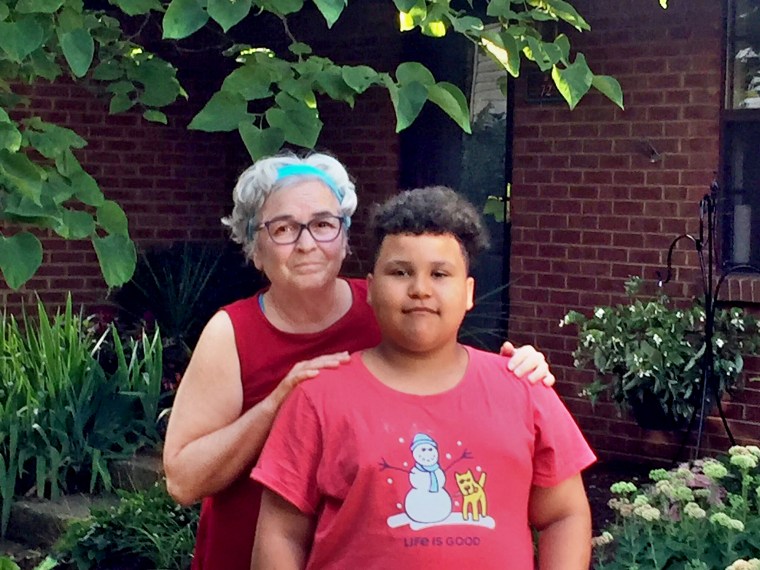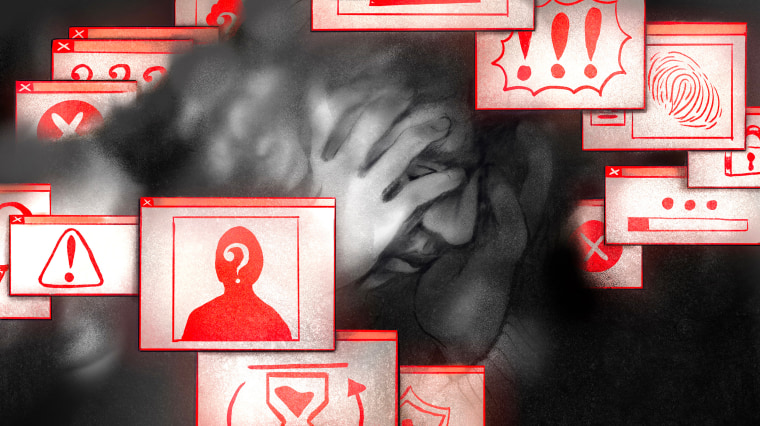Before she was furloughed in March because of the coronavirus pandemic, Chantel Clark had worked for years as a visual merchandiser at a Macy's in Georgia so she would have the flexibility in her schedule to care for her son, who has special needs.
When she was called back to work in May, she took the opportunity. But when her 8-year-old son's special needs camp and school stopped offering in-person classes, "there were no good child care options," said Clark, 39. Without access to family leave, she had to resign to take care of her son, she said.
Because she resigned, she hadn't qualified for regular unemployment insurance. But she believed she would be eligible for Pandemic Unemployment Assistance, or PUA, special unemployment compensation for people who don't ordinarily qualify for unemployment benefits, including parents unable to work because of child care needs during the pandemic.
In Georgia's system, she needed to apply for state unemployment insurance first and be denied before she could apply for PUA, which also covers gig workers and the self-employed. She applied in August, but both her initial claim and her subsequent PUA claim have been denied. She was told she didn't meet the criteria for benefits, and she is awaiting the results of an appeal.
"All the way through now, I haven't received a dime from anyone," she said.
She's far from alone. Months after the coronavirus began battering the U.S. economy, millions of jobless people still haven't received unemployment benefits, the nonpartisan Century Foundation think tank estimated. Others have endured extensive delays.
In some cases, states are too overwhelmed to tackle their immense backlogs of applications, said Andrew Stettner, a senior fellow at the foundation. In other instances, aggressive systems to root out fraud are slowing getting much-needed aid in people's hands.
"That's been very difficult, very frustrating for people that have, some of them, waited many, many weeks or even months for their benefits," he said. "It's a big issue."
To make ends meet, Clark and her husband used the money they had been saving to purchase a home. They can no longer afford speech therapy or applied behavioral therapy for her son. They sold their second car. And Clark's husband is working double shifts, picking up extra work whenever he can, "just to keep our family afloat," she said.
Clark said that her husband has diabetes and that the family is "making miracles every single month just to afford his prescription medication, because it's so expensive."
"You're just trying to hold on day by day, and it makes it so much more difficult when you have no communication with anyone," she said. "It drains you so mentally and emotionally, and it makes you just feel worthless, like you're begging someone to give you something that was entitled to be given."
Unemployment claims remain well above pre-pandemic levels, when weekly applications typically numbered around 225,000. Claims reached a high of 7 million in March, according to the Labor Department, before they fell in the summer. The number of people applying for first-time unemployment claims has hovered around 1 million in recent months; 847,000 claims were filed in the week that ended Jan. 23, the department reported. Nearly 16 million people now get some type of unemployment assistance.
State agencies say they have hired new employees, brought back retired ones and worked seven days a week to try to keep up with the staggering number of claims, while also trying to combat fraud.
Unemployment agencies in Georgia, California, Oregon and Kentucky didn't immediately respond to requests for comment.
Millions of people are still waiting to be approved or rejected for benefits, Stettner said, citing the foundation's data.
The foundation also looked at claims levels Dec. 26 and estimated how much would have been paid out if benefits hadn't been interrupted by the delay in enacting the stimulus bill at the end of December. The group found that the program should have been paying out $11.5 billion per week in January. Instead, it said, actual payouts reported by the Treasury Department for all unemployment benefits totaled $28.7 billion as of late January, about $17.3 billion less than the $46.1 billion in benefits "that would have gone out if everyone would have received the promised aid on time."
Stettner said that because state systems have been so overwhelmed, "anyone who had any kind of complication in their application was having a lot of problems and severe delays in the process."
That has been the case for Nicole, 34, an actor and teaching artist in California. Nicole, who asked that her last name not be used out of fear of future employment issues, filed for state unemployment insurance after her outlets for employment shut down in March. She applied for unemployment assistance and went months without a response.
"It's just all the waiting and all of the calling that you have to do that takes time away from actually looking for work or actually bettering your life," she said.
A few months after Nicole applied, California's unemployment office told her that the issue was that she had made money in New York and New Jersey before she moved to California in September 2019.
"So, not only was the California unemployment office overwhelmed, but they had to call the New York unemployment office to confirm my income and they're overwhelmed, and they also have to call New Jersey to verify my income," she said. "And I just kept being like: 'I have all my tax forms. I've had them all here for you. I faxed them to you. I've emailed them to you.'
"I just don't understand this very silly thing of verifying my income when I have federal documents proving what I made," she said.
Nicole said she had to go on food stamps for the first time, accept boxes of donated food and borrow money from her parents.
"If I didn't have that, I would have been homeless," she said. "I would have been on someone's couch for sure."
She received her benefits with back pay in August, five months after she applied — but because the state has yet to verify her New Jersey income, her benefits were still short of what they should have been, she said.
Any relief she felt was brief. In September, Nicole's benefits stopped without explanation, and she said she was back to calling the state's unemployment office to no avail until the assistance started again this month.
"It made me feel very small and very helpless," she said. "There was shame, and there still is shame."
As part of his proposed $1.9 trillion relief package, President Joe Biden has called for additional payments, including direct payments of $1,400 per person and a $400-a-week federal unemployment program.
In an executive order, the Biden administration established a coordination system across federal agencies to help people figure out what benefits they qualify for. The White House cited the difficulty laid-off or furloughed service workers have had getting timely access to benefits.
Mary Proffitt, 64, found herself applying for unemployment benefits for the first time after she was laid off from her restaurant job in Kentucky in March. Initially, the state's system just kept crashing, she said. She was eventually able to get through at the end of March, and she collected a few weeks of benefits, but after she had to recertify in May, she suddenly found herself in a callback queue. She waited 18 weeks before she got back payments and was able to pay her bills.

"I'd been living off of what little bit of savings I had prior to this, because you just literally can't go 18 weeks without a dime," said Proffitt, whose teenage son has special needs and whose immunocompromised father she helps support.
"The most stressful thing is having to juggle priorities and not having any income at all," she said. "Is it the light bill? I have to have cable, because we have to have Wi-Fi for school."
Even when the money did come in, her state unemployment benefits were just $131.
"My little $131 a week doesn't go very far. Everything has to be prioritized," she said. Her heating bill last month was $184; groceries were about $100 a week.
To supplement her income, she made embroidered masks for $20 apiece.
"We ate off my mask business for a while," she said.
Now, she again finds herself in a callback queue and hasn't gotten any assistance since November.
"If I dig deep into my soul, it's a miracle that I'm not suicidal, and I have talked to people who are at the end of their rope," Proffitt said.
"I really do feel that unemployed people are like the last people on the planet to be heard, and especially older people," she said. "Because we're just stuck. I will never financially recover from this."
Proffitt said the hardest part has been the holidays.
"I had to tell my special needs son that lights and heat were Christmas," she said.
Even when people like Proffitt successfully collect unemployment, the amount can be too low for many families to live on alone.
Stettner said state unemployment benefits average $339 a week. PUA has been averaging about $240 a week, he said.
The Coronavirus Aid, Relief and Economic Security Act, or CARES Act, the coronavirus relief law Congress passed last year, gave those receiving unemployment benefits an extra $600 a week from April to the end of July.
When the aid lapsed at the end of July, the Trump administration implemented a short-term program called Lost Wages Assistance, a $300 supplement that lasted for about five weeks.
Advocates have pushed to continue such relief payments, both to help people make ends meet and to stimulate the economy.
Stephanie Freed, co-director ExtendPUA, a group advocating for pandemic relief centered on unemployment and aid for workers, has been unemployed since March because of the pandemic.
Freed, a freelance production electrician and lighting designer in the entertainment business in New York City, said that in a survey in December of 1,300 unemployed and underemployed workers who use the organization's website, 9.9 percent said they still hadn't received benefits.
"With no boost to unemployment, it's not going to be solved," she said. "People are living in their cars. One woman reached out to us — she's living in her car, and now she can no longer go to the job interviews anymore because she can't afford gas.
"We've gotten ourselves into such a desperate, desperate place where millions of people — it's not hundreds of people that are falling through the cracks," she said.
Rachel Deutsch, the supervising attorney for worker justice at the Center for Popular Democracy, a progressive advocacy group, said that when people face such potentially long periods of unemployment, "if you don't supplement the pandemic or the regular state unemployment insurance with some additional income, people are going to face extremely dire consequences."
Valerie Turos, 35, a sound engineer, worked at the Oregon Shakespeare Festival and later for another theater in California before she was let go in the spring because of the pandemic. Turos said she initially had no issues with her unemployment claim in Oregon because she had a previously existing claim open.

Her ordeal began when that claim ran out, she said, and the Oregon Employment Department told her to file a claim in California, because she had since worked there, as well.
The verification process trudged along slowly, until finally, Turos said, she was told that part of the problem was that her W2 form was too blurry.
The claim has been pending since September.
"I kept calling every week, and it was kind of random who we would get to help from California unemployment. They had, like, a lot of people that had just been hired," she said. "So it kind of depends on who you get how much help you can get."
Eventually, she was told that she would be in the window to start a new claim again in Oregon, but because she had claimed another state through her California application, she had to do so by phone.
"I've been trying to call Oregon's unemployment for, like, the last several weeks. This morning, me and my wife each called 50 times, and it's just, like, a busy signal," Turos said. "I don't know how you can get through on the phone right now.
"It is a really scary process, and it's also just overwhelming that you just keep calling and you're told to call back or you can't get through," she said.
Deutsch said people "all need a safety net that actually catches us when we fall, and that this was not it."
"People have now realized that it doesn't matter who you are, what you've accomplished in your professional life, you can be vulnerable to this kind of precarity," she said.
"Yes, we need immediate relief. The December relief bill was not enough," she said. "But also, we need to be looking towards the kinds of structural changes that are required so that nobody has to go through this again."



